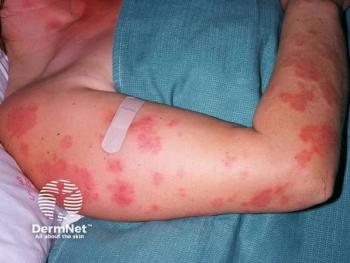
NIH Launches mRNA Nipah Vaccine Clinical Trial
An early-stage clinical trial will evaluate an investigational vaccine to prevent Nipah virus infection.
The National Institute of Allergy and Infection Diseases (NIAID), a section of the National Institutes of Health, announced the launch of a clinical trial to evaluate an mRNA Nipah virus vaccine. The experimental vaccine is manufactured by Moderna, Inc., in Cambridge, Massachusetts, and was developed in collaboration with NIAID’s Vaccine Research Center.1 Moderna has started dosing healthy participants in a phase I study to evaluate the safety, tolerability, and immunogenicity of the mRNA-based vaccine, also known as mRNA-1215. The study will take place at the NIH Clinical Center in Bethesda, Maryland.2
Nipah virus is a zoonotic disease that is spread between animals and people. It is also a pathogen which has been classified as lethal by multiple health organizations and authorities, including the World Health Organization (WHO), Centers for Disease Control and Prevention (CDC), and the Coalition of Epidemic Preparedness Innovations (CEPI).2 Fruit bats are the known host for the Nipah virus. The first reported outbreak occurred in 1998 in Malaysia and Singapore. During the outbreak, there were a total of 265 human cases and 105 deaths, as well as substantial damage to the area’s swine industry. Since the initial outbreak, annual outbreaks have occurred since 1999 in Asia, primarily in Bangladesh and India.1
“Nipah virus poses a considerable pandemic threat because it mutates relatively easily, causes disease in a wide range of mammals, can transmit from person-to-person, and kills a large percentage of the people it infects,” said NIAID director Anthony S. Fauci, MD. “The need for a preventive Nipah virus vaccine is significant.”
The symptoms can range from respiratory infection symptoms to encephalitis (brain swelling) leading to coma or death. Although most Nipah cases are transmitted via animals, person-to-person transmission is possible. Currently, there is no licensed vaccine or treatment for Nipah virus infection. 1
According to an announcement from the National Institutes of Health, “The experimental mRNA-1215 Nipah virus vaccine will be tested in a dose-escalation clinical trial to evaluate its safety, tolerability, and ability to generate an immune response in 40 healthy adults ages 18 to 60 years. Specifically, 4 groups of 10 participants each will receive 2 doses of the investigational vaccine via injection in the shoulder muscle 4 or 12 weeks apart. Group one (10 participants) will receive 2, 25-microgram (mcg) injections; group 2 will receive 2, 50-mcg injections; and group 3 will receive 2, 100-mcg injections, each 4 weeks apart. The vaccine dose for the fourth group of participants will be determined based on an interim analysis of the results from the three previous groups. The fourth group will receive 2 injections 12 weeks apart. Study participants will be evaluated through clinical observation and blood collection at specified times throughout the study and will be followed by clinical study staff through 52 weeks following their final vaccination.”1
References:
- NIH launches clinical trial of mRNA Nipah virus vaccine. National Institutes of Health (NIH). Published July 11, 2022. Accessed July 14, 2022.
https://www.nih.gov/news-events/news-releases/nih-launches-clinical-trial-mrna-nipah-virus-vaccine - Moderna (Mrna) starts early-stage nipah virus vaccine study. Accessed July 14, 2022. https://finance.yahoo.com/news/moderna-mrna-starts-early-stage-145902578.html
Newsletter
Like what you’re reading? Subscribe to Dermatology Times for weekly updates on therapies, innovations, and real-world practice tips.












